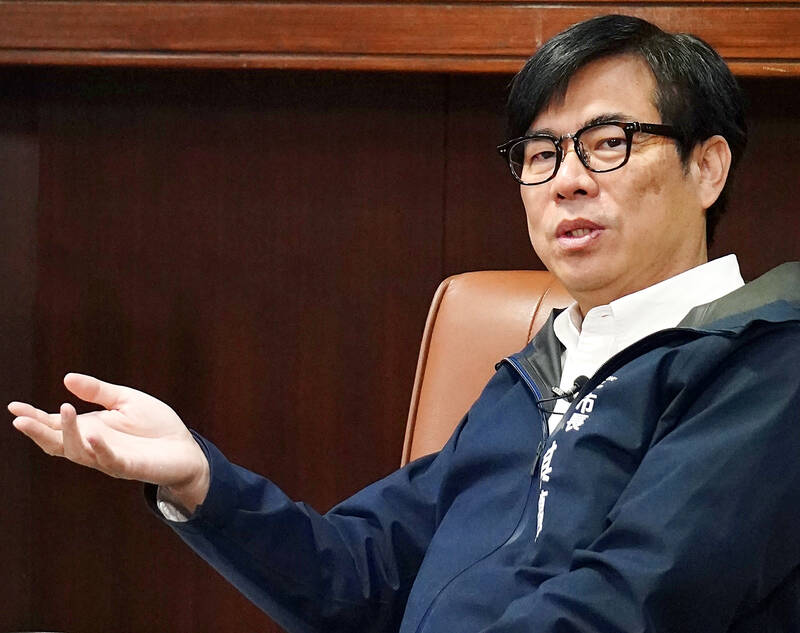Taiwan Semiconductor Manufacturing Co’s (TSMC, 台積電) investment in Kaohsiung has played a key role in driving the city’s urban development, Kaohsiung Mayor Chen Chi-mai (陳其邁) said in an interview on Monday.
“TSMC’s investment has been the engine powering Kaohsiung’s transformation,” Chen said.
Historically a heavy industrial city, Kaohsiung has leveraged TSMC’s investment to drive the digital transformation of related industries, including steel and petrochemicals, Chen said.

Photo: CNA
In recent years, the southern port-city has focused on enhancing infrastructure for water and electricity, talent development, and public services to ensure smoother operations for TSMC, Chen said.
TSMC plans to invest in five factories in Kaohsiung, with the first plant already equipped and expected to start mass production next year or early the following year — six months ahead of schedule, Chen said.
He added that the second to fifth plants are progressing according to plan, as TSMC ramps up its production of high-end chips in both Kaohsiung and Hsinchu, in northern Taiwan.
To support this expansion, the city government has set up four water recycling plants to meet TSMC’s demand for 110,000 tonnes to 120,000 tonnes of recycled water per day.
An ultra-high voltage substation and related feeder facilities have also been installed in the Nanzih Technology Industrial Park (楠梓產業園區), where the TSMC facilities are located, to ensure stable power supply.
In addition, Kaohsiung is building a new provincial highway and interchanges connecting Freeway No. 1 to ensure the separation of large vehicles from regular traffic, enhancing efficiency and road safety.
TSMC’s Kaohsiung plant enjoys a unique advantage in terms of its transportation network, Chen said.
Compared to TSMC’s other global production sites, the plant in Kaohsiung is positioned in the center of the city, making it the only TSMC plant in the world to be directly adjacent to the MRT, high-speed rail and freeway, he said.
As a result, in the future semiconductor companies in Kaohsiung, Tainan, Chiayi County and Pingtung County will all be in close proximity, which will help drive industry integration, Chen said.

Vincent Wei led fellow Singaporean farmers around an empty Malaysian plot, laying out plans for a greenhouse and rows of leafy vegetables. What he pitched was not just space for crops, but a lifeline for growers struggling to make ends meet in a city-state with high prices and little vacant land. The future agriculture hub is part of a joint special economic zone launched last year by the two neighbors, expected to cost US$123 million and produce 10,000 tonnes of fresh produce annually. It is attracting Singaporean farmers with promises of cheaper land, labor and energy just over the border.

US actor Matthew McConaughey has filed recordings of his image and voice with US patent authorities to protect them from unauthorized usage by artificial intelligence (AI) platforms, a representative said earlier this week. Several video clips and audio recordings were registered by the commercial arm of the Just Keep Livin’ Foundation, a non-profit created by the Oscar-winning actor and his wife, Camila, according to the US Patent and Trademark Office database. Many artists are increasingly concerned about the uncontrolled use of their image via generative AI since the rollout of ChatGPT and other AI-powered tools. Several US states have adopted

A proposed billionaires’ tax in California has ignited a political uproar in Silicon Valley, with tech titans threatening to leave the state while California Governor Gavin Newsom of the Democratic Party maneuvers to defeat a levy that he fears would lead to an exodus of wealth. A technology mecca, California has more billionaires than any other US state — a few hundred, by some estimates. About half its personal income tax revenue, a financial backbone in the nearly US$350 billion budget, comes from the top 1 percent of earners. A large healthcare union is attempting to place a proposal before

KEEPING UP: The acquisition of a cleanroom in Taiwan would enable Micron to increase production in a market where demand continues to outpace supply, a Micron official said Micron Technology Inc has signed a letter of intent to buy a fabrication site in Taiwan from Powerchip Semiconductor Manufacturing Corp (力積電) for US$1.8 billion to expand its production of memory chips. Micron would take control of the P5 site in Miaoli County’s Tongluo Township (銅鑼) and plans to ramp up DRAM production in phases after the transaction closes in the second quarter, the company said in a statement on Saturday. The acquisition includes an existing 12 inch fab cleanroom of 27,871m2 and would further position Micron to address growing global demand for memory solutions, the company said. Micron expects the transaction to